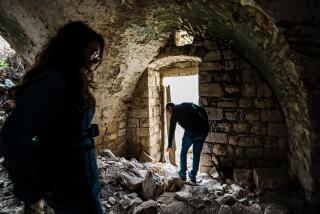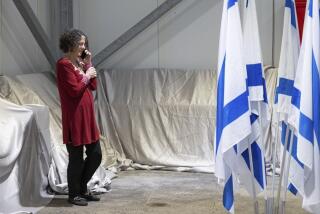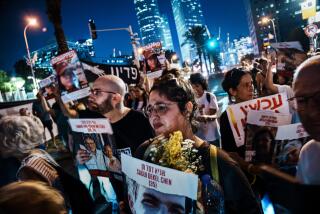Abu Nidal Reportedly Visits Lebanese Base to Say Goodby to 2 Young Hostages
- Share via
NICOSIA, Cyprus — Abu Nidal, the world’s most-wanted terrorist and a possible suspect in last week’s crash of a Pan Am jumbo jet in Scotland, was reported Tuesday to have made a rare appearance in Lebanon.
A spokesman for Abu Nidal’s guerrilla group, Revolutionary Council of Fatah, said the terrorist, whose real name is Sabri Banna, had visited a “secret base” in Lebanon to say farewell to two kidnaped French girls who were about to be released by the organization.
The spokesman said Abu Nidal visited the base with his second-in-command, Salim Ahmed, but did not say when or where the meeting took place. Israeli officials have said they believe that Abu Nidal shuttles between Lebanon’s eastern Bekaa Valley and Libya.
Security Arrangements
“The two comrades expressed their satisfaction over the special security arrangements taken to enable the two girls to reunite safely with their family,” the spokesman told news agencies in Beirut.
The announcement Tuesday from Abu Nidal’s Beirut office was part of a bizarre chain of events that began in November, 1987, when the group announced the seizure of five Belgians and three French citizens--including the two girls--aboard a yacht off the Israeli-occupied Gaza Strip.
The group initially said the captives were Israelis, but French and Belgian authorities said none of those kidnaped was Jewish. Western diplomats said the kidnaping appeared to have been the result of a mix-up or misrepresentation.
Abu Nidal’s spokesman said the two girls, Marie-Laure Betille, 7, and Virginie Betille, 6, were being sent to Paris, but there was no report of their arrival there. The spokesman hinted that they were sailing home.
‘Tools of the Mossad’
The statement said the other hostages, who include the girls’ mother, Jacqueline Valente, are “tools of the Zionist Mossad and have made valuable confessions.” The Mossad is Israel’s intelligence service.
“I ask the father, Pascal Betille, to be ready with lots of Christmas gifts to reunite with his daughters,” the spokesman said. Betille, who is separated from the girls’ mother, spent the weekend in Beirut in anticipation of his daughters’ release.
The announced release reportedly follows the intervention of Libyan leader Moammar Kadafi.
Syria last year closed down Abu Nidal’s offices in Damascus after coming under international pressure. But the Revolutionary Council of Fatah openly maintains offices in Tripoli, the Libyan capital.
Tensions have been rising in recent days between Libya and the United States over allegations that Libya has built a factory for producing chemical weapons near Tripoli. President Reagan has said the United States is considering what action to take, raising the possibility of a military attack.
The United States bombed two military sites in Libya in April, 1986, after a terrorist attack on a West Berlin discotheque in which a U.S. serviceman and a Turkish woman were killed. A second serviceman died later of injuries.
Abu Nidal broke with the Palestine Liberation Organization in 1974 when a PLO court convicted him of embezzling funds, sedition and murder and sentenced him to death.
He received a life sentence in absentia from an Italian court in February for masterminding two near-simultaneous 1985 attacks on the Rome and Vienna airports in which 20 people were killed, including four of the attacking terrorists. He is being sought by anti-terrorist officials on three continents for hijackings, assassinations and political violence.
Some security experts in the Middle East have cited Abu Nidal’s organization as the most likely suspect in the crash of Pan Am Flight 103 in Lockerbie, Scotland, last Wednesday in which 259 people aboard the plane were killed. At least 10 townspeople are listed as missing and presumed dead. Although British officials have said they have no firm evidence of sabotage, a bomb is considered the most likely cause of the plane’s disintegration in the air.
The experts noted that Abu Nidal’s group had access to a powerful plastic explosive known as Semtex H and air-pressure-sensitive detonation devices because they were sold to the Libyan government by former CIA agent Edwin P. Wilson, who is now serving a prison sentence in the United States.
Their speculation appeared to be bolstered by reports of a Dec. 5 telephoned warning to U.S. diplomats in Helsinki that a Pan Am flight, originating in Frankfurt, West Germany, as Pan Am Flight 103 did, would be bombed by members of the Abu Nidal group. But Finnish authorities say they know the caller and they, as well as the FBI, have discounted the call as not genuine.
Disrupted Peace Efforts
In the past, Abu Nidal’s organization has been particularly active at times when it appeared that the mainstream PLO was adopting a more conciliatory stand toward Israel. The apparent aim was to disrupt the peace process by making the Palestinians appear as unreformed terrorists.
Radical Palestinian groups reacted angrily to a statement by PLO leader Yasser Arafat two weeks ago renouncing terrorism in all forms and accepting Israel’s right to exist alongside a newly declared Palestinian state.
The statement led to the opening of talks between the PLO and the United States after a 13-year ban by Washington on contacts.
More to Read
Sign up for Essential California
The most important California stories and recommendations in your inbox every morning.
You may occasionally receive promotional content from the Los Angeles Times.













